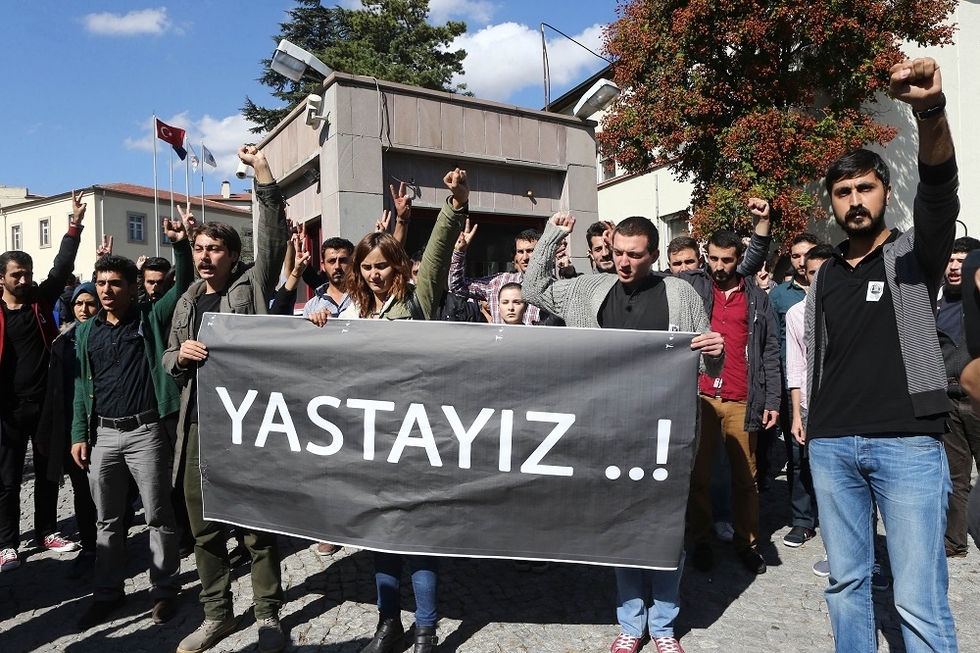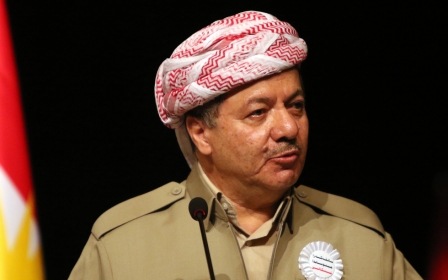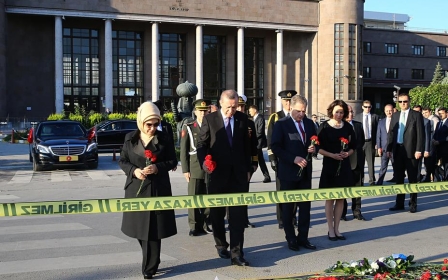ANALYSIS: Turkey - a country divided

ISTANBUL, Turkey - As portions of Turkey’s civilian Kurdish population have come under periodic attacks, fears have been growing that Kurds with no specific political affiliation inside Turkey could begin carrying out retaliatory assaults and may send the country spiralling into an ethnic conflict.
Kurds are Turkey's largest ethnic minority. Estimates vary but they are believed to account for between 15 to 20 million of Turkey’s 75 million-strong population.
Nowhere is this situation more in the spotlight than in the country’s largest city Istanbul, which is home to the biggest ethnic Kurdish population outside Turkey’s south-eastern regions.
Kurdish and left-leaning groups have been the victims of three major bombings since June. The latest one, which rocked Ankara over the weekend, was the worst such tragedy ever experienced in Turkey. At least 97 people were killed in the dual suicide blast, and hundreds more injured. The attack has widely been blamed on the Islamic State group, although two alleged PKK supporters have now been arrested for tweeting about the bombing in an apparent attempt to also link the Kurdistan Workers’ Party to the blast. Authorities allege that the tweets indicate prior knowledge of the attack, although others insist that the tweets merely warned of possible attacks.
Angry nationalist mobs have also attacked regular Kurdish citizens and the offices of the pro-Kurdish Peoples’ Democratic Party (HDP) in various cities in September after renewed hostilities between the state and the PKK - these first broke out in July after more than 30 pro-Kurdish activists were killed in a blast in Suruc in southern Turkey. The PKK blamed the Turkish government for not doing enough to combat IS and began attacking Turkish military positions, while the government responded by bombing PKK positions largely in northern Iraq, sparking the latest flare-up in violence.
Fear of public spaces
Mithat Besi, 46, a businessman from Istanbul who is an ethnic Kurd, said that while Kurds in Istanbul are fearful, it is no more than the fear felt by all the city’s residents.
“Everyone who uses public transport and goes into public spaces in Istanbul feels fear these days. In fact, perhaps Kurds are less fearful because we have become accustomed to being targets over so many years,” Besi told Middle East Eye.
Besi believes the way authorities have behaved over the last two elections in the country – the 7 June general election and the presidential election in August 2014 - and also during the Gezi protests in 2013 has meant that many Kurds and Turks have actually come together in solidarity, and don’t see each other as the enemy.
The heavy-handed response by security forces to any situation not to their liking has not gone down well with many citizens.
“While the rage we feel at our brethren being targeted is immense, I doubt it will spill over into retaliatory attacks because we have long moved past thinking of resorting to a mob or lynching culture,” Besi said. “Besides being targeted is not a new experience for us.”
Cesim Soylu, co-chair of the HDP’s Istanbul branch, is more pessimistic and said patience is wearing thin among the country’s Kurds, as repeated bomb blasts at mainly Kurdish events seek to sow fear.
“I sincerely hope that we don’t see a spillover of this anger into civil strife because that will only mean more deaths. But we are already facing increasing criticism from our supporters for continuing to call for calm and responsible behaviour in the face of such attacks blatantly targeting our people,” Soylu told MEE.
However, others are less concerned.
Vahap Coskun, an academic at the law faculty at Diyarbakir’s Dicle University, argued that there is no risk of ethnic strife in the country despite the bloody attacks aimed at inciting divisions.
“Yes, of course the government needs to be held responsible for the safety of all its citizens just like anywhere else in the world, but to immediately accuse the government and president of being killers is simply political posturing and has no basis in reality or logic,” Coskun told MEE.
“All citizens are aware enough to see through this.”
Nevertheless, the extreme polarisation in the country during recent years along right-wing conservative and left-wing liberal lines, as well as along religious-secular lines, means that the widening of an already existent ethnic fault line could leave the country facing unprecedented scenes of turmoil.
This is being made worse by the ruthless exploitation of nationalist sentiments, which are never far from the surface in Turkey, and tend to be dredged up by Turkish and Kurdish politicians for electoral gains.
Exploiting nationalist fervour
Critics of the ruling Justice and Development Party (AKP) have accused the party’s hierarchy of fuelling Turkish nationalist sentiment given their vitriolic attacks against the HDP, whose electoral gains the AKP consider as one of the major causes behind its inability to form a single-majority government after the 7 June general elections.
Turkish President Recep Tayyip Erdogan has previously referred to HDP co-chairman Selahattin Demirtas as being "terrorist-linked".
"You are cooperating with a separatist terrorist organisation," Erdogan said at a rally in eastern Turkey in June, referring to Demirtas.
"Your brother is already on the mountain," he added, referring to Demeritas's brother who is reportedly based in northern Iraq with the PKK.
The AKP has also been accused of not doing enough to protect the country’s Kurdish citizens but belated calls by officials to differentiate between Kurdish citizens and PKK-related actions at the end of September was seen as too little too late.
Coskun considers the AKP’s hostile approach to the HDP to be flawed and says that the HDP needs to remain a part of the political process but he also believes that it is not just the AKP that has been working to entrench polarisation in the country.
“The HDP has based its entire reason for existence on enmity and opposition to the AKP and [Turkish President Recep Tayyip] Erdogan. They too have a big role to play in this poisonous polarisation,” said Coskun.
According to HDP’s Soylu the upcoming elections - scheduled for 1 November but possibly due to be delayed due to ongoing tensions - play a huge part in this recent spate of attacks against Kurdish groups but they are not the sole factor.
“Kurds have faced attacks even before the elections and while I think it plays a huge part, I don’t think it will all of a sudden be fine once the elections are concluded. There are many other factors involved, not least the situation in the Middle East,” he said.
Who is being targeted?
However, even the most die-hard critics of the AKP government cede that during its early years in power it carried out the most comprehensive reforms in modern Turkey’s history to ensure equal rights for the country’s Kurds.
Some even believe that even the Kurds, like the rest of society, are targeted for their political leanings instead of their ethnicity. Critics from this school of thought say that only Kurds who back left-leaning groups like the HDP are at risk. The AKP considers the HDP to be the political wing of the PKK and against whom Turkey has been engaged in war with since 1984. Instead, Kurds who support the AKP – which many in the main cities do – are not singled out.
Despite Coskun’s belief that the AKP’s Kurdish policy is erroneous, he said to accuse the AKP of being against all Kurds is ridiculous and that its relentless verbal attacks on the HDP should be seen as reciprocal political rivalry and not ethnic-based hatred.
“After all we are talking about a party that gave serious impetus to the peace process and eagerly set about tackling an issue many deemed to be intractable.”
Many believe if the ruling party were to abandon its harsh attacks on the HDP just for the sake of electoral gains, it would go a long way towards calming tensions and preventing a potential flare-up.
But regardless of political manoeuvring, the deteriorating security situation and the targeting of one segment of society leaves open the possibility that the country will eventually go down a precarious road.
“Every single person in the country deserves equal rights and peace of mind,” said Besi. “[But] this is something that is sorely lacking at the moment.”
New MEE newsletter: Jerusalem Dispatch
Sign up to get the latest insights and analysis on Israel-Palestine, alongside Turkey Unpacked and other MEE newsletters
Middle East Eye delivers independent and unrivalled coverage and analysis of the Middle East, North Africa and beyond. To learn more about republishing this content and the associated fees, please fill out this form. More about MEE can be found here.




